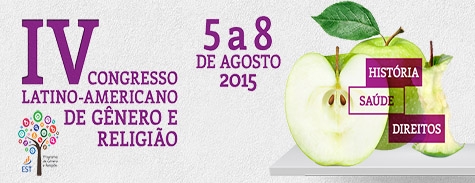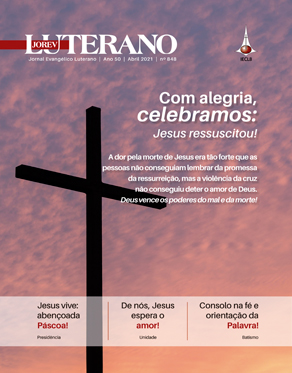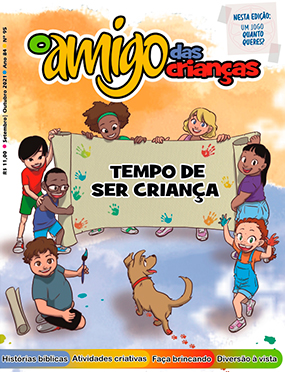
OPEN LETTER
OF THE IV LATIN AMERICAN CONGRESS ON GENDER AND RELIGION
The IV Latin American Congress on Gender and Religion took place from August 5th to 8th of 2015 gathering more than three hundred people coming from 15 countries and from all the regions of Brazil on the campus of Faculdades EST. The event gathered together people connected to the field of public policies and governmental institutions, religious groups and institutions, popular and social movements, researchers of various areas of knowledge and debated various themes organized around the thematic axis of “history, health and rights”.
During three days of an intense and varied program we celebrated advances conquered in all areas as a result of the confrontation of systems which generate violence and death. We recognized and affirmed our ways of production of knowledge in the area of feminist, gender and sexual diversity studies articulated with the various political movements in the civil sphere, in the context of the churches and religious groups and of academic research. We reiterated that there were advances in the struggles and that the intensification of the fundamentalist forces is a reaction to these conquests.
The reports, research and practices which were shared point to a threatening conjuncture against the improvement of life conditions of women and other social groups and the rights already conquered. In reaction to the advances conservative sectors have become articulated in our continent undermining the construction and consolidation of the democratic processes. We know of the seriousness of these movements, but we believe in our capacity to resist and to continue walking the path of social transformation. We are many and we will not turn back.
Faced with this situation we denounce:
- the political, economical, cultural and religious obstacles which impede the advancement of a democratic agenda which guarantees human rights;
- the capitalist, patriarchal, racist, sexist, heterosexist and classist system which produces violence, especially against girls, women, blacks, lesbians, gays, bisexuals, transvestites, transsexuals and transgendered;
- the use of means of communication and information to reproduce ideas which strengthen the fundamentalist actions and strategies in all areas of society;
- the attack of fundamentalist forces on any initiatives which try to guarantee sexual rights, reproductive rights, the rights of the LGBTIQ population, stem cell research and the use of birth control devices;
- the feminization of poverty and the feminization of violence as a revolting legacy which emanates from these patriarchal, racist and fundamentalist structures;
- the exclusion of the gender perspective in the Municipal, State and National Educational Plans, the interference in the decisions of the Supreme Federal Court and the proposition of law drafts in the National Congress of Brazil such as the Statute of the Unborn, the Statute of the Family, Reduction of the Legal Age, PEC 99/2011;
- the attempt to impede any advance in the conceptions of family, in the decriminalization of abortion, in the guarantee of LGBTIQ rights;
- the upsurge of violence due to racial motives;
- the problem situations provoked by teen pregnancies;
- the assassinations of Lesbians, Gays, Bisexuals, Transvestites, Transsexuals and Transgendered;
- the escalation of violence in countries such as Mexico, Honduras, Colombia;
- forced and obligatory marriage of girls and women;
- forced migrations and their occult side (traffic of people, especially of girls and women, drug trafficking and firearms trafficking);
- the violation of the human rights of women and transgendered people in prisons;
- the criminalization of the indigenous, quilombola and small farmers struggles and the threat to human life caused by the use of agro-toxins sustained by agribusiness;
- the precariousness of domestic work and the inequality of income in relation to women;
- the naturalization of the suffering of women, in general interpreted as disconnected from their socialcultural contexts, supported by the hegemonic biomedical discourse;
- the bad use of theories and perpetuation of gender stereotypes in the churches, in the public sphere and in academic research as a way of discriminating against, invisibilizing and excluding women from leadership in the ministries of the churches, in the decision making spaces and in academic research;
- the use of elements from sacred texts and traditions which legitimate discrimination, subordination and oppression, thus justifying various forms of violence and the maintenance of the status quo.
And we commit ourselves to:
- the defense and promotion of the secular state as the guarantee that freedom of expression, freedom of conscience, religious freedom and diversity may be possible in democracy;
- the promotion of Sexual Education for the promotion of health and prevention of illnesses such as AIDS and the inclusion of gender and sexuality discussions in the public policies of education, health and mental health;
- the strengthening of the combative and liberating character of our work and resumption of the feminist agendas into the work which we do;
- the recognition of youth as proposers of new epistemologies and new hermeneutical and spirituality practices;
- the struggle for the inclusion of dealing with class, gender, sexuality, deficiency, race and ethnicity in all social institutions and in school curricula;
- the review of traditional methods, pedagogical and discourse practices and carrying out advocacy actions in all the areas of our work;
- the need of recovering our public voice such as social movements, religious groups and teaching and research institutions;
- the affirmation the traditional knowledges of the native peoples and the popular wisdoms as Science which contribute to recreating spirituality, health and epistemology, for an agro-ecological project of a civilization of well living;
- the production, divulgement of and work with documents, practices and studies produced in the feminist field, and that of gender and of sexual diversity in governmental, religious, theological and social movement spaces;
- the need to review, demand and elaborate the inclusion of Feminist Theology, and Studies of Gender, Sexual Diversity, Class and Ethnicity in the curricular courses of Theology, of Sciences of Religion and of Religious Education, capacitating people for this work also in fundamental and secondary education, public and private;
The whole set and detailing of these issues can be accessed in the other documents and materials produced throughout these days and made available in various means.
São Leopoldo, August 8th 2015














